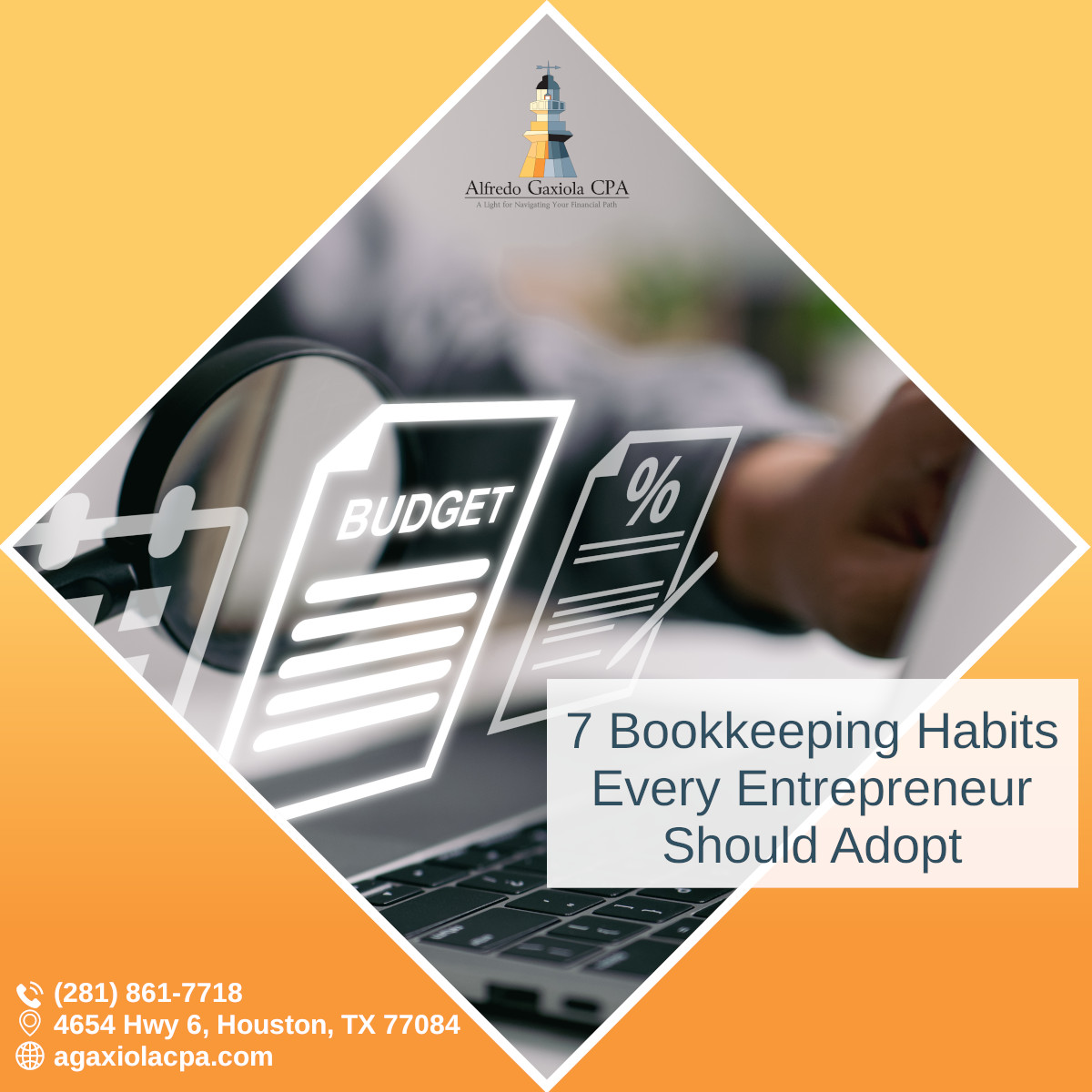
7 Bookkeeping Habits Every Entrepreneur Should Adopt
Consulting Services in Houston
1. Get professional help to prepare tax returns
Business owners are pulled in a dozen different directions. That’s why it makes sense to outsource work you don’t have the expertise or time to do. If you’re like many entrepreneurs, you likely went into business to pursue a passion, not to become an accountant.
“Sometimes outsourcing the job to somebody who can do a quicker and better job is much smarter than trying to tackle it yourself,” Smith says.
Professional accountants can do more than just ensure your returns pass muster. A trained financial eye can spot ways that your bookkeeping processes—and perhaps your business itself—can be improved.
For example, most businesses aren’t aware of all the tax deductions they can claim to ultimately reduce their overall tax burden. With a trained eye, Smith was able to able to help one of her past clients save over $1,000 on her return, which took her from owing money to the IRS to receiving a small refund.
2. Don’t go entirely “hands-off”
Outsourcing your bookkeeping doesn’t mean you should leave it entirely to somebody else. “You’ll want to review reports, understand what’s happening with your business, and ask the right questions (when you don’t),” Smith says.
No matter your level of accounting expertise, it is beneficial to your business for you to understand as owner some of the basic business numbers, including profit, trend in expenses, accounts receivable, profit per customer, and how your client funnel works. Here is an article that summarizes why these five numbers matter and how you can use them to monitor the health of your business.
3. Get the right software
“You don’t want to skimp on the program that you use,” Smith advises, noting that a good system is worth the money. These days there is more choice than ever, so businesses no longer have to use accounting software designed for accountants.
There are many different options out there, so look for a system that best meets your business needs—and one that you’ll actually use. If you’re not an accountant by training, then avoid systems that require a telephone book sized manual to get started.
If you’re looking for a shortcut, ask for recommendations from friends who run businesses similar to yours.
4. Document your processes
For her own business, Smith has written documents that explain how bookkeeping processes should run. “No matter who looks at it, it’s done my way,” she says, noting these processes prevent confusion and answer questions before they’re asked.
Consistency is key for good bookkeeping and can help you spot errors later on, since you’ll have a good idea of what may have gone wrong.
5. Keep expense receipts
You can’t know how much you’re spending on your business if you don’t keep receipts. This is somewhat straightforward for credit card purchases, since you’ll have both receipts and monthly statements against which to check them.
Where things can get tricky is if you aren’t careful with cash expenses. These receipts matter even more since there are no backup statements. Some people keep a small notebook with them to log cash expenses as they’re incurred. Better yet, entrepreneurs could follow Smith’s lead—she uses an accounting app on her phone to snap pictures of her receipts as she goes, and doesn’t keep the paper copies.
6. Track your receivables
It’s one thing to issue invoices, but it’s another to ensure your invoices are paid. Keep up-to-date logs of your invoices and the status of each—sent, received, paid, partially paid, and late. Some accounting solutions can even keep track of invoices and flag late and unpaid invoices automatically.
7. Ask your accountant how you can work as a team
Business owners often look at their accountants as just another expense, and only visit during tax crunch time. A trusted accountant, however, can be a key ally in your business, helping to guide its path to success, shaping it to provide better returns, and helping spot potential issues in the business before they arise.
Entrepreneurs should approach their accountants as business partners, not just tax prep, and find someone who can offer insight into the business. A great accountant can help take a business to the next level.
Source: bplans

Alfredo Gaxiola has worked on numerous IRS problem cases and has successfully settled with the IRS to release liens on houses, bank accounts and wages and, if needed, setting a payment installment plan that is not burdensome for the client. He has conducted appeals before the U.S. Tax Court and obtained favorable resolutions in reducing the tax debt of his clients. Mr. Gaxiola served as Treasurer of Camara de Empresarios Latinos, one of the largest and strongest Hispanic organizations in the city of Houston. He has conducted financial and accounting seminars for the Houston Small Business Development Corporation, as well.
Consulting Services in Houston
Certified Public Accountant in Houston, Alfredo Gaxiola CPA in Houston, Certified QuickBooks Proadvisor in Houston, QuickBooks Set Up and Training in Houston, Business Tax Return in Houston, Personal Tax Returns in Houston, Quarterly & Monthly Filings in Houston, Financial Statement Preparation in Houston, Consulting Services in Houston, Payroll Preparation in Houston, Bookkeeping Services in Houston, Bank Financing in Houston, IRS representation in Houston, Business Planning in Houston, Personal Finance in Houston, Income in Houston
(281) 861-7718
This email address is being protected from spambots. You need JavaScript enabled to view it. This email address is being protected from spambots. You need JavaScript enabled to view it. Location
(281) 861-7718 This email address is being protected from spambots. You need JavaScript enabled to view it. This email address is being protected from spambots. You need JavaScript enabled to view it.
Location
© Alfredo Gaxiola, CPA. All rights reserved.
Website designed by LaraNet | Expand Your Business!



